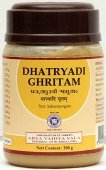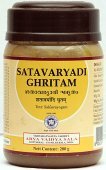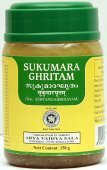Mridvika, Mṛdvīkā: 15 definitions
Introduction:
Mridvika means something in Hinduism, Sanskrit. If you want to know the exact meaning, history, etymology or English translation of this term then check out the descriptions on this page. Add your comment or reference to a book if you want to contribute to this summary article.
The Sanskrit term Mṛdvīkā can be transliterated into English as Mrdvika or Mridvika, using the IAST transliteration scheme (?).
In Hinduism
Ayurveda (science of life)
Cikitsa (natural therapy and treatment for medical conditions)
Source: Wisdom Library: Ayurveda: CikitsaMṛdvīkā (मृद्वीका):—Another name for Drākṣā (Vitis vinifera), a species of medicinal plant and used in the treatment of fever (jvara), as described in the Jvaracikitsā (or “the treatment of fever”) which is part of the 7th-century Mādhavacikitsā, a Sanskrit classical work on Āyurveda.
Kalpa (Formulas, Drug prescriptions and other Medicinal preparations)
Source: Shodhganga: Edition translation and critical study of yogasarasamgrahaMṛdvīkā (मृद्वीका) is another name for “Drākṣā” and is dealt with in the 15th-century Yogasārasaṅgraha (Yogasara-saṅgraha) by Vāsudeva: an unpublished Keralite work representing an Ayurvedic compendium of medicinal recipes. The Yogasārasaṃgraha [mentioning mṛdvīkā] deals with entire recipes in the route of administration, and thus deals with the knowledge of pharmacy (bhaiṣajya-kalpanā) which is a branch of pharmacology (dravyaguṇa).
Toxicology (Study and Treatment of poison)
Source: Shodhganga: Kasyapa Samhita—Text on Visha ChikitsaMṛdvīkā (मृद्वीका) refers to “grapes”, and is an ingredient used in the treatment (cikitsā) of rat poison (ākhu-viṣa), according to the Kāśyapa Saṃhitā: an ancient Sanskrit text from the Pāñcarātra tradition dealing with both Tantra and Viṣacikitsā—an important topic from Āyurveda which deals with the study of Toxicology (Viṣavidyā or Sarpavidyā).—Kāśyapa has recommended a slew of generic formulae that successfully neutralise rat poison.—According to Kāśyapasaṃhitā (verse 11.85): “Grapes (mṛdvīkā), black Yaṣṭi, with its root, ghee and Pāṭalī, root of white Arka, two kinds of turmeric, Doṣā, cooked in ghee, is an effective antidote. Ghee mixed with urine and two types of Kaśmarī is also prescribed.”.
Unclassified Ayurveda definitions
Source: eJournal of Indian Medicine: Jajjaṭa’s Nirantarapadavyākhyā and Other Commentaries on the CarakasaṃhitāMṛdvīkā (मृद्वीका) is a synonym of Drākṣā, which refers to Vitis vinifera Linn., and is a medicinal plant mentioned in the 7th-century Nirantarapadavyākhyā by Jejjaṭa (or Jajjaṭa): one of the earliest extant and, therefore, one of the most important commentaries on the Carakasaṃhitā.—Synonyms of Drākṣā: Amṛtaphalā, Mṛdvīkā.—(Cf. Glossary of Vegetable Drugs in Bṛhattrayī 208-209, Singh and Chunekar, 1999)

Āyurveda (आयुर्वेद, ayurveda) is a branch of Indian science dealing with medicine, herbalism, taxology, anatomy, surgery, alchemy and related topics. Traditional practice of Āyurveda in ancient India dates back to at least the first millenium BC. Literature is commonly written in Sanskrit using various poetic metres.
Purana and Itihasa (epic history)
Source: archive.org: Nilamata Purana: a cultural and literary studyMṛdvīkā (मृद्वीका) refers to “partially dried grapes ”, forming part of a common diet in ancient Kashmir (Kaśmīra) as mentioned in the Nīlamatapurāṇa.—The term Mṛdvīkā denotes partially dried grapes (verse 416). The abundance of grapes in Kaśmīra is proved by the statements of Bilhaṇa, Kalhaṇa and Varāhamihira. Most of the references to the articles of diet occur in the Nīlamata in connection with the offerings made to the gods but it is not difficult to infer from them the food and drink of the common people because “what a man eats his gods eat”.

The Purana (पुराण, purāṇas) refers to Sanskrit literature preserving ancient India’s vast cultural history, including historical legends, religious ceremonies, various arts and sciences. The eighteen mahapuranas total over 400,000 shlokas (metrical couplets) and date to at least several centuries BCE.
Shaivism (Shaiva philosophy)
Source: Brill: Śaivism and the Tantric TraditionsMṛdvīkā (मृद्वीका) refers to “grapes”, according to the 13th-century Matsyendrasaṃhitā: a Kubjikā-Tripurā oriented Tantric Yoga text of the Ṣaḍanvayaśāmbhava tradition from South India.—Accordingly, “[The intercourse (saṃga)]:—[...] He should dry brahmamaṇḍūkī together with its roots in the shade. He should mix it with grape-juice (mṛdvīkā-rasa), candied sugar and ghee. He should have it three times [a day] for three months in portions measuring a dice as food and drink and he should drink milk. His semen will not deteriorate in millions of years if he practises sex [with Māyā]. His [semen] will never ever wane. It is for the rejuvenation of the body, O Priyā. [...]”.

Shaiva (शैव, śaiva) or Shaivism (śaivism) represents a tradition of Hinduism worshiping Shiva as the supreme being. Closely related to Shaktism, Shaiva literature includes a range of scriptures, including Tantras, while the root of this tradition may be traced back to the ancient Vedas.
Languages of India and abroad
Sanskrit dictionary
Source: DDSA: The practical Sanskrit-English dictionaryMṛdvīkā (मृद्वीका).—A vine or bunch of grapes; वाचं तदीयां परिपीय मृद्वीं मृद्वीकया तुल्यरसां स हंसः (vācaṃ tadīyāṃ paripīya mṛdvīṃ mṛdvīkayā tulyarasāṃ sa haṃsaḥ) N.3.6; मृद्वीका रसिता सिता समशिता (mṛdvīkā rasitā sitā samaśitā)... Bv.4.13,37; Mahābhārata (Bombay) 7.64.7.
See also (synonyms): mṛdvī.
Source: Cologne Digital Sanskrit Dictionaries: Shabda-Sagara Sanskrit-English DictionaryMṛdvīkā (मृद्वीका).—f.
(-kā) A grape. E. mṛd to hurt, kīkan aff. and uk augment.
Source: Cologne Digital Sanskrit Dictionaries: Benfey Sanskrit-English DictionaryMṛdvīkā (मृद्वीका).—[mṛdvī + kā] (mṛdu, f.), f. A grape.
Source: Cologne Digital Sanskrit Dictionaries: Cappeller Sanskrit-English DictionaryMṛdvīkā (मृद्वीका).—[feminine] a vine or bunch of grapes.
Source: Cologne Digital Sanskrit Dictionaries: Monier-Williams Sanskrit-English DictionaryMṛdvīkā (मृद्वीका):—[from mṛd] f. a vine, a bunch of grapes ([especially] a reddish one), [Suśruta; Varāha-mihira’s Bṛhat-saṃhitā etc.]
Source: Cologne Digital Sanskrit Dictionaries: Yates Sanskrit-English DictionaryMṛdvīkā (मृद्वीका):—(kā) 1. f. A grape.
Source: DDSA: Paia-sadda-mahannavo; a comprehensive Prakrit Hindi dictionary (S)Mṛdvīkā (मृद्वीका) in the Sanskrit language is related to the Prakrit word: Muddiā.
[Sanskrit to German]
Sanskrit, also spelled संस्कृतम् (saṃskṛtam), is an ancient language of India commonly seen as the grandmother of the Indo-European language family (even English!). Closely allied with Prakrit and Pali, Sanskrit is more exhaustive in both grammar and terms and has the most extensive collection of literature in the world, greatly surpassing its sister-languages Greek and Latin.
See also (Relevant definitions)
Starts with: Mridvikadi, Mridvikarasa.
Ends with: Prithumridvika.
Full-text: Prithumridvika, Mridvi, Mardvika, Muddia, Draksha, Vriddhika, Amritaphala, Sphita, Snehopaga, Ras, Ashvagandha, Muddika, Rasa.
Relevant text
Search found 8 books and stories containing Mridvika, Mṛdvīkā, Mrdvika; (plurals include: Mridvikas, Mṛdvīkās, Mrdvikas). You can also click to the full overview containing English textual excerpts. Below are direct links for the most relevant articles:
Atharvaveda and Charaka Samhita (by Laxmi Maji)
Classification of Drugs in the Caraka-Saṃhitā < [Chapter 4 - Diseases and Remedial measures (described in Caraka-saṃhitā)]
Therapeutics and Rejuvenation Therapy < [Chapter 4 - Diseases and Remedial measures (described in Caraka-saṃhitā)]
Charaka Samhita and Sushruta Samhita (by Nayana Sharma)
Appendix 1 - Description of a Hospital < [Chapter 4]
Sahitya-kaumudi by Baladeva Vidyabhushana (by Gaurapada Dāsa)
Text 4.64 < [Chapter 4 - First-rate Poetry]
The Garuda Purana (by Manmatha Nath Dutt)
Chapter CXCIII - Medical treatment of fever etc < [Dhanvantari Samhita]
Chapter CCXXVII - Different names of the Ayurvedic Drugs < [Dhanvantari Samhita]
The Agni Purana (by N. Gangadharan)
Sushruta Samhita, volume 1: Sutrasthana (by Kaviraj Kunja Lal Bhishagratna)
Related products
(+1 more products available)





